Classification
Sinusitis is a disease of the mucous membrane lining the paranasal sinuses and nose, affecting one or more paranasal sinuses. Depending on the duration and changes in the mucous membrane, types of sinusitis can be distinguished:
- Acute sinusitis, which after healing leaves no changes in the mucous membrane, begins suddenly, symptoms usually last no longer than 4 weeks
- Recurrent acute sinusitis, is recurring, with at least four episodes of acute inflammation within a year, lasts an average of 7 days, is appropriately treated does not result in permanent changes, and usually a transitional stage that leads to chronic sinusitis
- Subacute sinusitis, the infection in this case lasts from 4 to 12 weeks, and after remission does not become a chronic process
- In chronic sinusitis, in this case, the inflammation cannot be eliminated by conservative treatment, is usually the result of improper treatment or lack thereof during the acute inflammation period, and the duration of inflammation is longer than 12 weeks
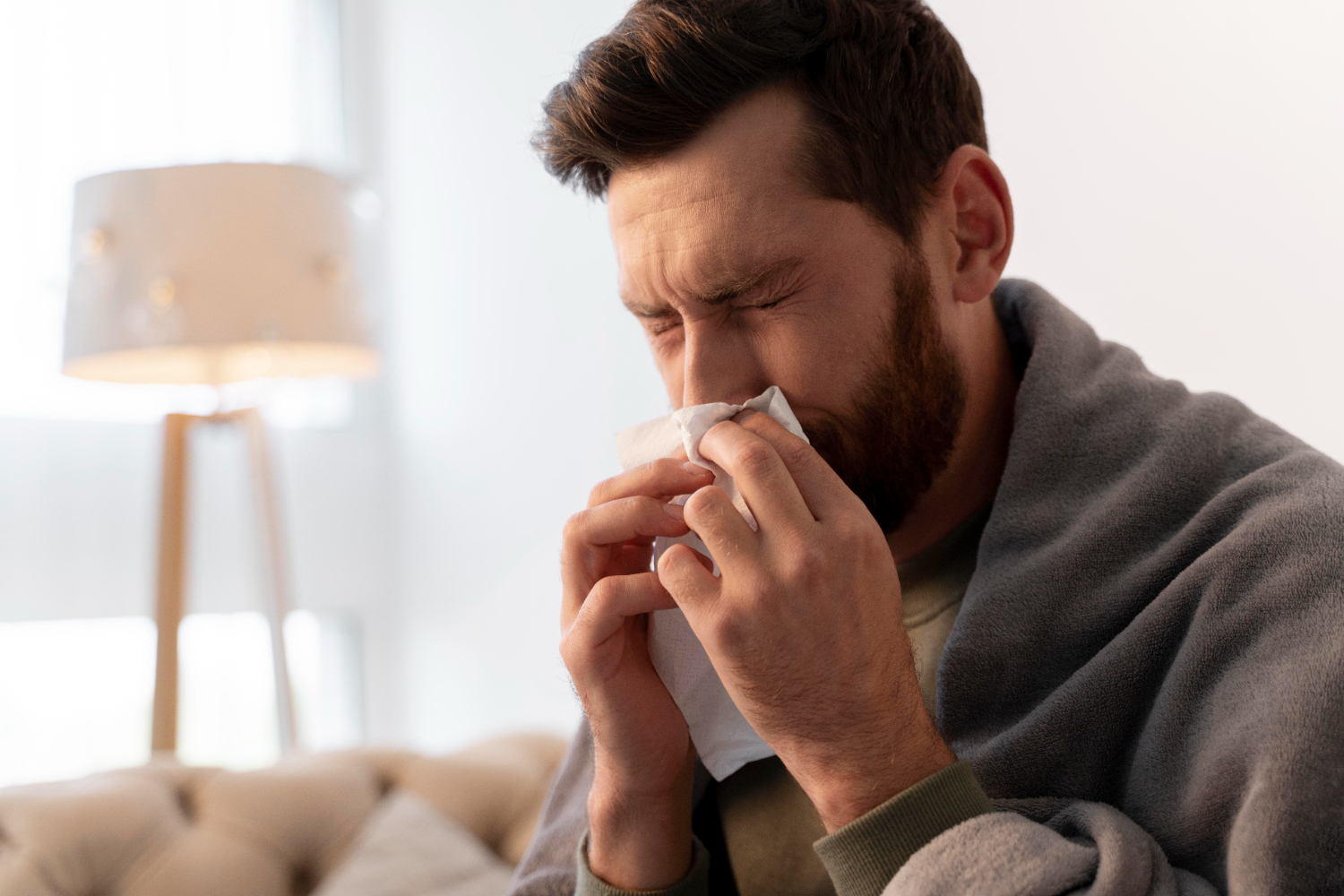
Causes
The cause of any kind of sinusitis, like most upper respiratory tract conditions, can be viral, bacterial, fungal or allergic. The most common cause of acute sinusitis is viruses, such as rhinoviruses, coronaviruses, adenoviruses or influenza virus. Colonization by bacteria (the three most common are Streptococcus pneumoniae, Haemofilus influenzae and Moraxella catarrhalis) usually occurs as a result of superinfection during a viral infection or allergic reaction. Fungal sinusitis can occur in people with weakened immunity or diabetes.
Currently, the cause is increasingly often an unrecognized or poorly controlled allergy. Sometimes sinusitis can be caused by chronic irritation of the mucous membrane by physical factors (e.g. cigarette smoke – both active and passive smoking) or a tooth infection of root origin. Also, a significant degree of nasal septum deviation can contribute to frequent sinusitis, especially unilateral sinusitis.
Symptoms of chronic sinusitis can be exacerbated by air pollution or irritants, including in the workplace.
Symptoms
Depending on the duration of the condition, acute sinusitis (usually up to 4 weeks) and chronic sinusitis are distinguished. The symptoms are similar and those include:
- A feeling of pressure in the facial area (nose, temples, forehead)
- Sinus pain – worse when tilting the head or with exertion
- Yellow nasal discharge
- Nasal congestion
- Runny nose, presence of discharge in the nasal cavities
- A feeling of discharge flowing down the back of the throat
- Headaches and pain in the eye socket area, cheek, and toothache in the case of maxillary sinus involvement
- A feeling of distention in the sinuses affected by inflammation
- Swelling and feeling of distention in the area of the bridge of the nose
- Change in voice
- Deterioration of well-being
Often, symptoms in the initial stage can be overcome using simple home remedies for sinusitis. Appropriate treatment will also reduce the risk of a more serious infection, progression of the disease into chronic sinusitis, and the appearance of dangerous complications.
Ordinary sinusitis can develop into bacterial sinusitis – there is a risk of bacterial infection of the secretion accumulating in the sinuses and the development of a severe infection.
Treatment
It is not always necessary to visit a doctor immediately when experiencing symptoms of sinusitis. However, a medical consultation is recommended if these symptoms persist for several days or worsen. It’s also advisable to seek help for recurrent sinusitis.
Home Remedies
While following a treatment plan prescribed by a specialist, you can also incorporate home remedies for sinus relief. Often, small changes in daily habits can lead to a milder course of sinusitis, enhancing comfort and reducing the risk of developing a chronic infection.
Home remedies for sinusitis, which alleviate the symptoms, include:
- Rest – is indicated in most infections. In addition to the coexisting general weakening of the body due to inflammation, staying at home, in a warm place, reduces the risk of bacterial superinfection with additional pathogenic microorganisms
- Drinking plenty of fluids – mainly water or tea with lemon. It allows for the thinning of the secretion produced and its easier removal from the sinuses
- Sinus irrigation
- Inhalations
- Warm, moist face compresses – they reduce the feeling of pain and bring relief
- Sleeping with your head raised – this will facilitate the gravitational drainage of excess secretion from the sinuses; usually, it is enough to put a second pillow under your head
Irrigation
Home remedies for sinus issues often include sinus irrigation, which is a highly effective method in combating sinusitis. The fluid introduced into the nose (sea water, saline, distilled water) flows through the nasal passages, and sinuses, flushing them of accumulated mucus, bacteria, and other allergens.
Secretions in the sinuses cause pain and an annoying feeling of pressure in the head. Sinus rinsing with a saline solution brings quick relief. Irrigate using a special bottle, according to the manufacturer’s recommendations. Properly performed, the procedure is safe and quickly cleanses and unblocks the sinuses.
It brings immediate relief, helps moisturize the mucous membranes, and, above all, makes breathing easier. Ready-made liquids are available in pharmacies without a prescription. Sinus rinsing should be done over the sink.
The irrigator or rubber nozzle is inserted into the nose, the head is tilted to the side, at a 45° angle, to introduce the liquid into the upper nasal passage. The liquid flows through the passages and sinuses, flows out through the lower nostril, and then the action is repeated for the other side.
Seawater spray is also helpful in daily nasal hygiene, as it flushes out dust and allergens and dilutes too-thick secretions. The application of isotonic or hypertonic seawater solution is safe and easy to perform. It can be used from the first days of a child’s life.
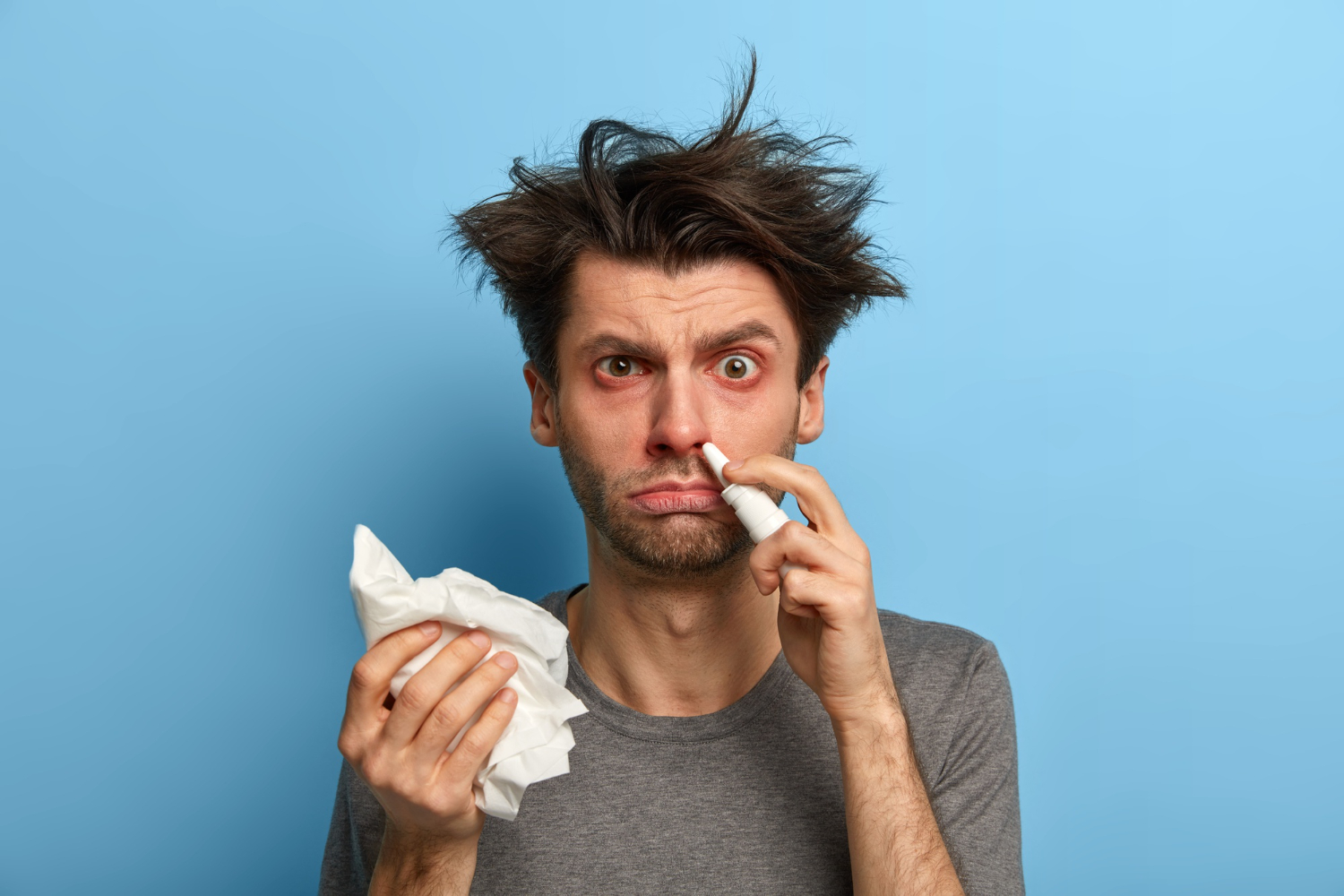
Inhalation
Steam inhalation is effective for symptoms of sinusitis, which provides moisturization of the upper respiratory tract. Pour boiling water into a pot or bowl and lean over the container with your head covered with a towel – inhaling warm steam should take at least a few minutes, several times a day.
After an inhalation session, nasal cleansing should become easier and more effective. You can also add salt, chamomile, or essential oils (e.g., pine, mint, eucalyptus) to hot water, which can increase the effectiveness and at the same time make inhalation a more pleasant experience.
Herbal Medicines
To treat sinusitis at home, it is essential to incorporate natural methods, even if antibiotics are recommended. However, always ask a specialist if the method that you want to use is safe.
Herbal medicines used in sinus diseases include:
- Thyme herb – has a bactericidal effect, helps to thin the secretion and thus unclog the sinuses. An infusion used for sinus inhalation is effective. Add thyme oil. It has antispasmodic and bactericidal effects and thins the accumulated secretion. For respiratory tract diseases, drink an infusion of this herb or use steam inhalation with thyme oil
- Peppermint leaf – has anti-inflammatory and disinfecting effects. If used as an element of sinus inhalation, it lets them to clear and facilitate breathing
- Elderberry flower – destroys viruses, allows you to get rid of thick secretions from the sinuses, protects the mucous membranes of the respiratory tract
- Lavender flower – lavender oil obtained from it has antiseptic and bactericidal effects – in the case of sinus treatment, steam inhalation using this oil will work great
- Linden flower – thanks to the content of mucous compounds, it has anti-inflammatory, protective, and soothing effects on respiratory diseases
For problems with sick and blocked sinuses, seawater for the nose, available in the form of nasal drops or spray, will also work well. Sinus medications in the form of tablets with pseudoephedrine will also bring relief.
Medications
In addition to the above principles of proper treatment for suspected sinusitis, use numerous sinus medications and medical devices available over the counter at the pharmacy.
Over-the-counter methods for sinusitis are:
- Non-steroidal anti-inflammatory drugs – reduce pain in sinusitis and relieve inflammatory symptoms
- Decongestants – usually in the form of nasal sprays – are particularly effective for a blocked nose
- Seawater – used to rinse the sinuses and rinse and moisturize the nasal mucosa
- Antiallergic agents, antihistamines – if allergic sinusitis is suspected, a trial (several days) use of antiallergic drugs may be considered
- Vitamins – primarily vitamin C
- Spices – ginger and turmeric – added to dishes can help the body fight inflammation thanks to their natural anti-inflammatory effects. Similarly, hot spices (e.g., paprika) can help unclog the nose
Massage And Warm Compresses
To loosen the secretions in the upper respiratory tract, apply a warm compress to the forehead and nose area. For this purpose, you can use a hot water bottle with dried cherry pits. Then perform a massage, pressing on the forehead, eye sockets, and nasal bones. Some people feel relief after the first such procedure of heating and massaging the sinuses.
Proper Hydration
Staying hydrated is crucial for treating sinus issues. It enhances the function of the respiratory tract mucosa and reduces the thickness of secretions. Aim to drink 2-3 liters of water each day. This habit will not only help combat sinusitis but will also have long-term health benefits. If plain water isn’t your preference, consider herbal or fruit teas, such as those made from elderberry flowers, which can also alleviate cold symptoms.
Clean Air
Dry indoor air increases the risk of sinusitis and prolongs the duration of the disease. We can observe this, especially in the autumn-winter heating period, when the air humidity in our apartments drastically drops. Dry respiratory mucosa promotes the development of infections and inflammation. To avoid this, get home humidifiers that will restore the correct parameters in the room. Also, make sure that the bed is at the proper distance from the radiator. Otherwise, the problem with sinuses may worsen.
Polluted air also promotes the occurrence of infections and inflammation of the upper respiratory tract. Avoid cigarette smoke, and if you live in an area covered by smog, get air-filtering masks. If you suffer from inhalation allergies, give up carpets, curtains, and drapes in the house, which are frequently a breeding ground for numerous pathogens. Air out the apartment often so that mold does not develop on the walls. Also, pay attention to the condition of the air conditioning in the house and car. These devices should be cleaned regularly. Otherwise, they spray bacteria and other pathogens, leading to serious health consequences.
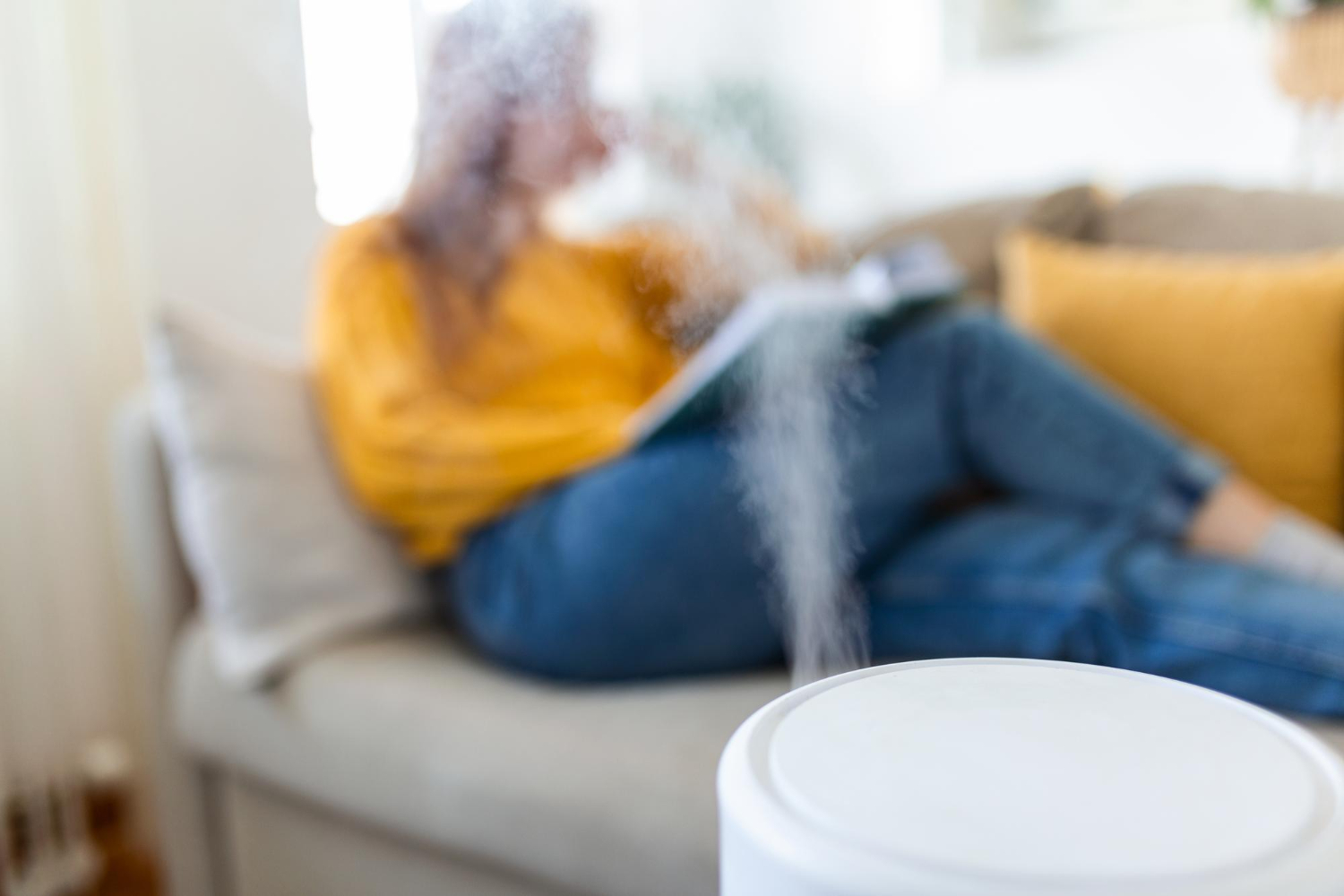
Air Humifidier
Another method to maintain proper air quality is by using air humidifiers. These simple devices help ensure adequate humidity levels in enclosed spaces, which is particularly important during the winter when heating systems are in use. Keep humidifiers clean, as dirty ones can become breeding grounds for harmful pathogens.
Prevention
As with all diseases, prevention is better than cure in sinusitis. It is worth paying attention to small actions that can significantly reduce the risk of sinusitis, while not making everyday functioning difficult. You can try:
- Avoiding leaving the house with wet hair
- Wearing warm hats on cold days
- Proper management and treatment of colds
- Quitting smoking, avoiding tobacco smoke and polluted air
- Avoiding rooms with dry air (e.g., permanently air-conditioned)
Natural Immunity
Sinus problems often appear as a result of reduced immunity and ongoing inflammation in the body. That is why you need to take care of a balanced diet and appropriate physical activity. Additionally, do not forget about rest, relaxation, and sufficient sleep. All this contributes to the proper functioning of the body.
When the temperature drops, wear a hat to protect your head from the cold and wind. Also, remember to dry your hair thoroughly before going outside. Although these are obvious things, many people ignore them, thus exposing themselves to a sinus cold.
Sources
- Sinusitis. NIH.
https://www.ncbi.nlm.nih.gov/books/NBK470383/ - Sinusitis. NHS.
https://www.nhsinform.scot/illnesses-and-conditions/ears-nose-and-throat/sinusitis/ - Sinusitis (sinus infection). NHS.
https://www.nhs.uk/conditions/sinusitis-sinus-infection/
Lupus: What Is, Warning Signals, Diagnosis, and Treatment
Sepsis: What Is, Course, Causes, and Symptoms
Congestive Heart Failure: What Is, Causes, Symptoms, and More

Pathogen: What Is, Types, Health Conditions, and How To Treat
Measles: What Is, Causes, Symptoms, and Diagnosis
Cirrhosis of the Liver: What Is, Manifestation, Causes
Bacterial Vaginosis: What Is, Causes, Symptoms and More
Epstein-Barr Virus: Symptoms, Causes, and Treatment
Sciatica: What Is, Symptoms, Diagnosis, and Treatment
Neuropathy: What Is, Symptoms, Causes, and Types

Hypertension: What Is, Symptoms, Treatment, and Complications
Hashimoto’s Disease: What Is, Causes, Symptoms, and Diagnosis
Atherosclerosis: What Is, Causes, Symptoms, and More
Osteoarthritis: What Is, Causes, Risk Factor, Symptoms, and More
Bell’s Palsy: What Is, Epidemiology, Causes, and More
